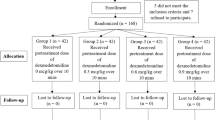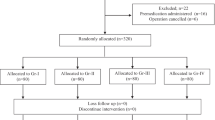Abstract
Purpose
To evaluate the suppressive effect of intravenous dezocine on fentanyl-induced cough during the induction of general anesthesia.
Methods
A total of 120 patients, American Society of Anesthesiologists (ASA) physical status I–II, were randomized into two equally sized groups (n = 60). These two groups were given either intravenous dezocine 0.1 mg/kg or a matching placebo (equal volume of 0.9% saline) 10 min before the induction of general anesthesia. Patients were induced with midazolam 0.1 mg/kg, fentanyl 5 μg/kg, propofol 1–1.5 mg/kg, and suxamethonium 1.5 mg/kg. The injection time of fentanyl was less than 2 s in all patients. The occurrence of cough was recorded 2 min after fentanyl bolus.
Results
No patient in the dezocine group had cough, and 42 patients in the control group had cough. This difference was statistically different between these two groups (P = 0.000).
Conclusion
These results demonstrate that intravenous dezocine 0.1 mg/kg 10 min prior to induction was effective in suppressing fentanyl-induced cough in our patients.
Similar content being viewed by others
References
Yu M-S, Kim JY, Kim HY. Intravenous dexamethasone pretreatment reduces remifentanil induced cough. Korean J Anesthesiol. 2011;60(6):403–7.
Morgan D, Cook CD, Smith MA, Picker MJ. An examination of the interactions between the antinociceptive effects of morphine and various m-opioids: the role of intrinsic efficacy and stimulus intensity. Anesth Analg. 1999;88:407–13.
Hung KC, Chen CW, Lin VCH, Weng HC, Hsieh SW. The effect of pre-emptive use of minimal dose fentanyl on fentanyl-induced coughing. Anaesthesia. 2010;65(1):4–7.
Lui PW, Hsing CH, Chu YC. Terbutaline inhalation suppresses fentanyl-induced coughing. Can J Anaesth. 1996;43(12):1216–9.
Tweed WA, Dakin D. Explosive coughing after bolus fentanyl injection. Anesth Analg. 2001;92(6):1442–3.
Ambesh SP, Singh N, Gupta D, Singh PK, Singh U. A huffing manoeuvre, immediately before induction of anaesthesia, prevents fentanyl-induced coughing: a prospective, randomized, and controlled study. Brit J Anaesth. 2010;104(1):40–3.
Lin JA, Yeh CC, Lee MS, Wu CT, Lin SL, Wong CS. Prolonged injection time and light smoking decrease the incidence of fentanyl-induced cough. Anesth Analg. 2005;101(3):670–4.
Chen YM, Chen WT, Liang SW, Gu MN. Intravenous injection rate and site of fentanyl affect the incidence and onset time of fentanyl-induced cough. Nan Fang Yi Ke Da Xue Xue Bao. 2009;29(2):339–40.
Lin JA, Chen FC, Lee MS, Horng HC, Cherng CH, Yeh CC, Wong CS. Intravenous dexamethasone pretreatment reduces fentanyl-induced cough. J Formos Med Assoc. 2007;106(8):649–55.
Lin CS, Sun WZ, CHan WH, LIn CJ, Yeh HM, Mok MS. Intravenous lidocaine and ephedrine, but not propofol, suppress fentanyl-induced cough. Can J Anaesth. 2005;52(2):207.
Pandey CK, Raza M, Ranjan R, Lakra A, Agarwal A, Singh U, Singh RB, Singh PK. Intravenous lidocaine suppresses fentanyl-induced coughing: a double-blind, prospective, randomized placebo-controlled study. Anesth Analg. 2004;99(6):1696–8 (table of contents).
Yeh CC, Wu CT, Huh BK, Lee MS, Lin SL, Sheen MJ, Wong CS. Premedication with intravenous low-dose ketamine suppresses fentanyl-induced cough. J Clin Anesth. 2007;19(1):53–6.
Tang Q, Qian Y, Zhang Q, Yang J, Wang Z. Effects of different priming doses of propofol on fentanyl-induced cough during anesthesia induction: a preliminary randomized controlled study. Ups J Med Sci. 2010;115(2):121–4.
Cho HB, Kwak HJ, Park SY, Kim JY. Comparison of the incidence and severity of cough after alfentanil and remifentanil injection. Acta Anaesthesiol Scand. 2010;54(6):717–20.
Gharagozlou P, Demirci H, Clark JD, Lameh J. Activation profiles of opioid ligands in HEK cells expressing delta opioid receptors. BMC Neurosci. 2002;3:19.
Karlsson JA, Lanner AS, Persson CG. Airway opioid receptors mediate inhibition of cough and reflex bronchoconstriction in guinea pigs. J Pharmacol Exp Ther. 1990;252(2):863–8.
Acknowledgments
This work was supported the Department of Anesthesia, The First Affiliated Hospital of Zhengzhou University, Zhengzhou, Henan, China.
Author information
Authors and Affiliations
Corresponding author
About this article
Cite this article
Sun, ZT., Yang, CY., Cui, Z. et al. Effect of intravenous dezocine on fentanyl-induced cough during general anesthesia induction: a double-blinded, prospective, randomized, controlled trial. J Anesth 25, 860–863 (2011). https://doi.org/10.1007/s00540-011-1237-x
Received:
Accepted:
Published:
Issue Date:
DOI: https://doi.org/10.1007/s00540-011-1237-x




